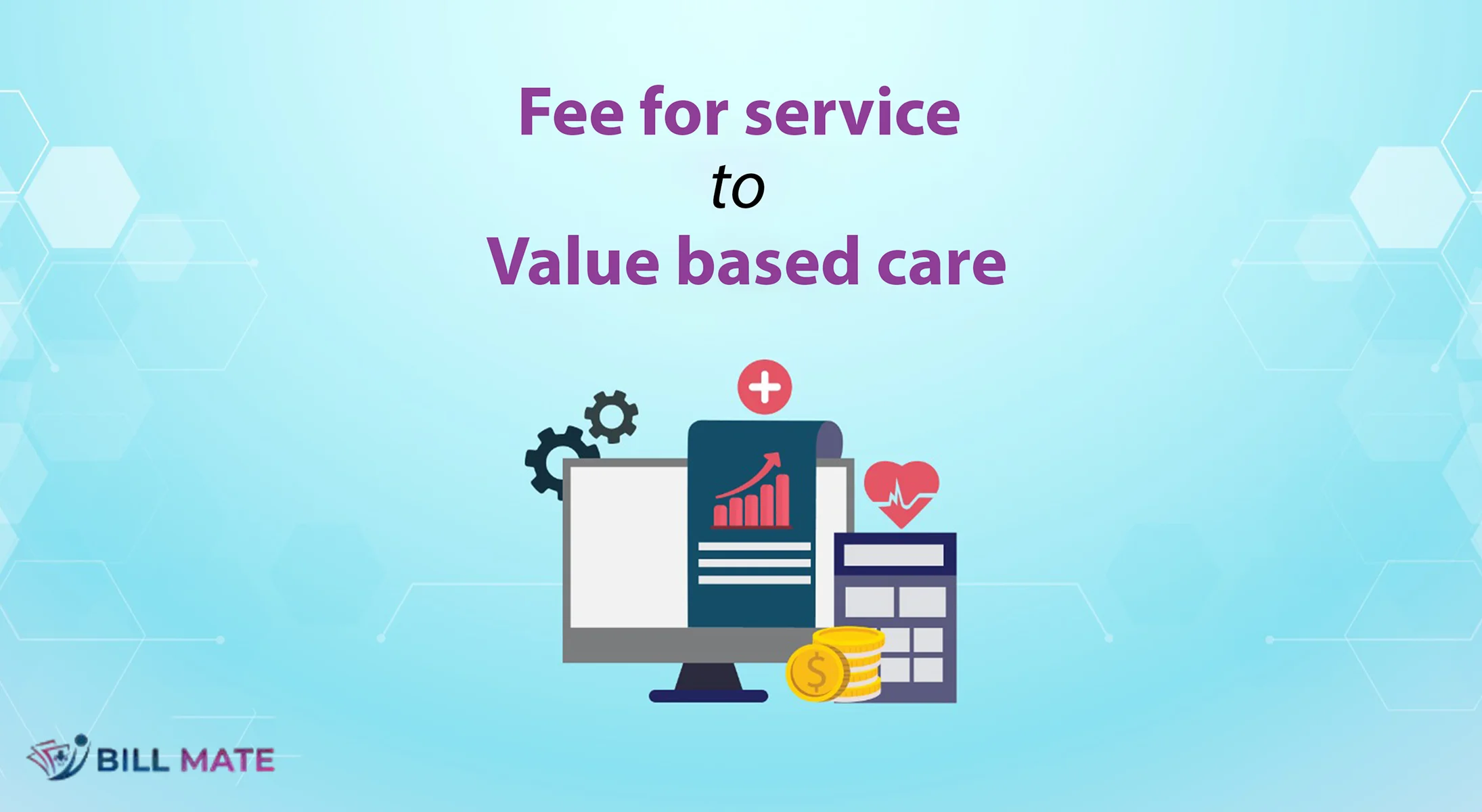
From Fee-for-Service to Value-Based Care: Billing Practices Must Evolve
By Billmate
Sept. 16, 2025, 10:31 a.m.
Introduction
The healthcare industry is undergoing a massive transformation. For decades, the fee-for-service (FFS) model dominated medical billing, rewarding providers for the number of services delivered rather than the quality of care. However, with rising healthcare costs, increased regulatory scrutiny, and the demand for better patient outcomes, the shift toward value-based care (VBC) is no longer optional; it's essential.
In this blog, we'll explore how billing practices must evolve in 2025 and beyond, why value-based care models are reshaping the industry, and how healthcare providers can optimize revenue while prioritizing patient outcomes.
What is Fee-for-Service (FFS)?

FFS is a traditional payment model where providers are reimbursed for each test, consultation, or procedure. While straightforward, this model often leads to:
-
Overutilization of services without improved outcomes.
-
Higher patient costs and rising healthcare expenditures.
-
Limited accountability for care quality.
According to the Centers for Medicare & Medicaid Services (CMS), the FFS model is gradually being replaced with value-driven programs that reward efficiency and effectiveness.
What is Value-Based Care (VBC)?

Value-based care focuses on patient outcomes, preventive care, and cost efficiency rather than volume. Providers are incentivized to deliver high-quality, coordinated care while reducing unnecessary spending.
Core Principles of Value-Based Care:
-
Patient-centered outcomes over service volume.
-
Preventive care and early intervention.
-
Integrated care teams for better coordination.
-
Data-driven performance measurement.
Why Billing Practices Must Evolve

Transitioning from FFS to VBC requires significant changes in medical billing practices. Traditional billing systems are not equipped to handle the complex metrics, reporting requirements, and risk-sharing arrangements inherent in VBC.
Key Drivers of Change:
-
Regulatory Pressure – CMS has mandated more Alternative Payment Models (APMs).
-
Payer Expectations – Insurance companies now demand quality-based metrics.
-
Patient Demands – Patients expect affordable, transparent billing tied to outcomes.
-
Technology Advancements – Automation, AI, and blockchain billing systems improve accuracy and compliance.
Top Billing Challenges in Value-Based Care

-
Complex Reimbursement Models: Unlike FFS, VBC requires tracking bundled payments, shared savings, and pay-for-performance contracts.
-
Data and Reporting Requirements: Providers must submit detailed quality metrics and prove performance to secure reimbursements.
-
Compliance Risks: With new models come stricter compliance regulations (HIPAA, CMS reporting). Non-compliance can mean costly penalties.
-
Interoperability Issues: Electronic Health Records (EHRs) and billing systems often lack integration, creating data silos.
Solutions: How Providers Can Adapt Billing Practices

-
Implement Advanced Revenue Cycle Management (RCM): Modern healthcare revenue cycle management systems streamline claim submission, track performance, and reduce errors.
Explore how BillMate can help: Medical Billing Services USA
-
Leverage Medical Billing Automation: Automation reduces manual coding errors, improves accuracy, and speeds up reimbursements. By 2025, medical billing automation will be a standard practice across healthcare providers.
-
Outsource Medical Billing Services: Outsource medical billing to experts who understand compliance, coding, and reporting for VBC. This reduces administrative burden and allows providers to focus on patient care.
-
Focus on Compliance and Risk Management: A medical billing compliance checklist 2025 ensures adherence to CMS and HIPAA regulations, minimizing claim denials and financial risks.
-
Invest in Staff Training: Billing staff must be trained in value-based metrics, coding standards, and compliance requirements to prevent costly mistakes.
Benefits of Adopting Value-Based Billing Practices

-
Fewer claim denials and reduced administrative overhead.
-
Improved patient satisfaction with transparent billing.
-
Higher reimbursements are due to performance and outcomes.
-
Enhanced provider reputation as patient-centric and future-ready.
Real-World Insights & Statistics
-
CMS projects that by 2030, all Medicare payments will be tied to value-based models.
-
Practices using outsourced medical billing solutions report a 20–30% reduction in claim denials.
-
According to the American Medical Association (AMA), providers adopting VBC achieve 10–15% higher reimbursements compared to FFS.
Conclusion: Preparing for the Future of Billing
The shift from fee-for-service to value-based care is inevitable. Healthcare providers who fail to adapt risk financial instability, compliance issues, and patient dissatisfaction. But those who embrace modern billing practices, automation, and expert medical billing services will thrive in this evolving landscape.
Frequently Asked Questions
1. What is the main difference between fee-for-service and value-based care?
Fee-for-service pays providers based on the number of services delivered, while value-based care rewards providers for the quality and outcomes of patient care.
2. Why do billing practices need to evolve for value-based care?
Traditional billing systems cannot handle bundled payments, quality reporting, or risk-sharing models. Modern billing practices ensure compliance, reduce denials, and optimize reimbursements.
3. How can automation improve medical billing in value-based care?
Automation reduces manual coding errors, speeds up claim processing, and ensures accurate reporting of value-based performance metrics.
4. What role does compliance play in value-based billing?
Compliance with CMS, HIPAA, and payer-specific requirements is critical. Non-compliance can lead to penalties, revenue loss, and reputational damage.
5. Should providers outsource medical billing for value-based care?
Yes. Outsourcing helps providers access specialized expertise, reduce administrative burdens, and improve reimbursement rates, allowing them to focus more on patient care.
6. What is the biggest benefit of adopting value-based billing practices?
The biggest benefit is achieving better financial performance while simultaneously improving patient satisfaction and health outcomes.
Ready to future-proof your billing system?
Schedule Your Free Consultation Today and let BillMate help you navigate the transition with confidence.
What To Read Next

By Billmate | February 23, 2026
Hospice Modifiers GV and GW: A Complete Guide for Medicare Billing
In-depth 2026 guide to hospice modifiers GV and GW, Medicare billing rules, documentation standards…

By Billmate | February 20, 2026
Tick Bite ICD-10 Codes and Billing Guide for Accurate Medical Coding
Complete guide to tick bite ICD-10 codes, Lyme disease coding, CPT tick removal billing, erythema m…

By Billmate | February 19, 2026
Denial Management in Medical Billing: Common Denials, Causes, and Prevention Strategies
Learn denial management in medical billing, common denials, eligibility denials, causes, prevention…

By Billmate | February 17, 2026
Mastering Revenue Cycle Management in Healthcare: A Comprehensive 2026 Guide
A comprehensive 2026 guide to revenue cycle management in healthcare, RCM in medical billing, hospi…

By Billmate | February 12, 2026
Patient Responsibility in Healthcare: How Providers Can Improve Collections Without Hurting Patient…
Learn how providers can improve patient responsibility collections without damaging trust, transpar…
Join our team to be a part
of our story
Learn more about our career, education and
posting jobs, and
submit simple application.